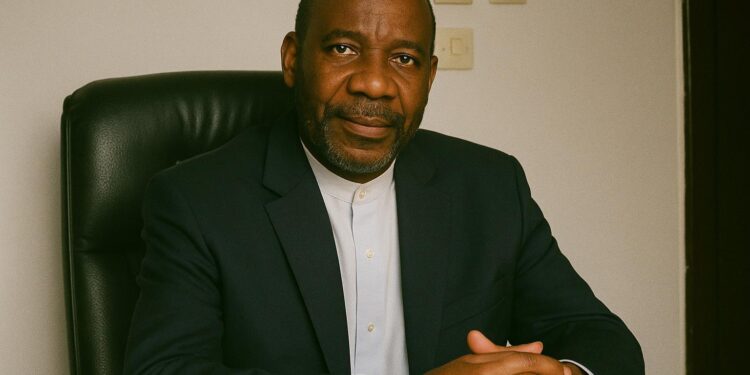Mateta’s Elevation and the 42-Party Landscape
The Ministry of the Interior’s decree No 1726 of 30 June 2025, which limits the number of legally recognised political organisations to forty-two, has imposed a rare moment of administrative clarity upon Congo-Brazzaville’s often fluid party system. Within this newly codified constellation, the Centrist Parties Gathering—better known under its French acronym RPC—emerged on 16 July as a structured interlocutor when its founding honorary president, Luc Daniel Adamo Mateta, was unanimously entrusted with the role of General Coordinator. According to participants in the closed-door session held in Brazzaville’s Diata district, his designation was less a surprise than a confirmation of a hidden consensus that had been incubating since the coalition’s inauguration in April 2023 (Les Dépêches de Brazzaville, 17 July 2025).
The new leadership ticket is completed by deputies Aimé Brice Mombo and Arnaud Abel Engondzo Mondongo, while a technical secretariat has been mandated to streamline inter-party communication. By formalising these internal mechanics, the RPC aligns with the ministry’s ambition to foster ‘rationalised pluralism’, a term increasingly used in Brazzaville to reconcile electoral diversity with institutional stability (Jeune Afrique, 2025).
The Elusive Grammar of Congolese Centrism
Congolese political vernacular has traditionally oscillated between left-leaning militancy and forces labelled conservative or nationalist. The RPC’s self-identification as a centrist forum therefore invites scrutiny. In conversations with academics at Marien Ngouabi University, centrism is defined less by a doctrinal canon than by a practical commitment to ‘pragmatism and realism’—the very words enshrined in the coalition’s founding charter. From an ideological vantage, the RPC pledges fidelity to patriotism and the pursuit of the common good, but its leaders insist that their novelty lies in method rather than in rhetoric. Mateta himself, reached by telephone, framed the coalition as ‘a school of responsible compromise, perfectly consonant with President Denis Sassou Nguesso’s call for inclusive governance’.
Such positioning allows the RPC to act as a moderating hinge between the presidential majority and a fragmented opposition mosaic. Analysts at the Institute for Security Studies note that centrist movements across Central Africa often serve as ‘transactional interfaces’, absorbing policy ideas from either pole while mitigating the acrimony that can threaten foreign investment flows (ISS Policy Brief, 2024). The Congolese variant appears intent on occupying precisely that diplomatic middle ground.
Dialogues with Brazzaville: Cooperation not Contestation
Contrary to expectations that any new political platform might declare adversarial intent, the RPC’s first communiqué emphasised constructive engagement with state institutions. In the words of Deputy Coordinator Mombo, the decree limiting party numbers is ‘a governance instrument, not a guillotine’. This conciliatory language has been well received by senior figures in the presidency, who interpret the coalition’s tone as evidence that administrative streamlining can coexist with democratic pluralism (Africanews interview, August 2025).
The coalition’s cooperative stance also offers Congolese diplomacy an additional talking point in regional fora. By demonstrating that regulatory oversight need not stifle opposition voices, Brazzaville can argue that its domestic reforms align with the African Union’s Agenda 2063, especially the aspiration for good governance and respect for constitutional order.
Regional Reverberations and Diplomatic Optics
Mateta’s ascent has not gone unnoticed in neighbouring capitals. In Kinshasa, commentaries underline the symbolism of a centrist bloc obtaining formal recognition at a moment when many African states grapple with extremist polarisation. Regional diplomats stationed in Brazzaville highlight that the RPC’s inter-party etiquette—codified in an internal ‘Civic Conduct Protocol’—could offer a soft-power export, especially in the CEEAC framework where conflict prevention mechanisms increasingly privilege dialogue-oriented actors (CEEAC Communiqué, April 2025).
For external partners, notably the European Union and multilateral lenders, the coalition’s commitment to institutional loyalty mitigates concerns around legislative unpredictability. A senior official at the EU Delegation in Congo, speaking under condition of anonymity, argued that ‘a centrist mediator endowed with administrative legitimacy simplifies policy coordination in sectors such as climate adaptation and infrastructure financing’. The observation suggests that Mateta’s mandate transcends domestic caucus management to occupy a discreet but pivotal place in Congo’s economic diplomacy.
Looking Ahead: Institutional Prudence and Pragmatic Hopes
The immediate challenge for the RPC resides in translating its unifying discourse into measurable legislative initiatives. Insiders concede that cultivating a joint policy platform among six distinct parties will require astute arbitration. Yet supporters point to Mateta’s record at the helm of the Union for the Reconstruction and Development of Congo—especially his role in municipal decentralisation projects—as proof of an aptitude for coalition-building.
In a polity where presidential authority remains paramount, the strategic value of a centrist coalition lies in its capacity to offer calibrated support, criticise without confrontation and thus enrich parliamentary deliberation. If the RPC realises that ambition, Congo-Brazzaville could consolidate a form of pluralism that is both manageable for the executive and credible to international observers seeking indices of democratic maturation. As one veteran diplomat in Brazzaville phrased it, ‘centrism may not set the river on fire, but it can keep the boat steady’.











































